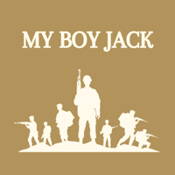
Overview
Synopsis
My Boy Jack is set during and in the years leading up to World War I. Named after Rudyard Kipling’s 1916 poem of the same name, the play dramatizes the poet’s real-life struggle after his son, John, goes missing in the Battle of Loos on the Western Front in France. The play depicts Kipling's unswerving determination to get John enlisted in the army, despite his son’s terrible eyesight. Kipling’s deep-rooted patriotism and the belief that all young men owe a debt of honor to their country leads to a family rift as his wife, Carrie, and daughter, Elsie, struggle to comprehend Kipling’s reasoning. After John goes missing, Rudyard and his wife, Carrie, spend the next two years trying to retrace what happened to their son. Finally, they discover his tragic fate in the face of enemy machine guns. With his son’s death lying heavily on his conscience, Kipling is forced to question his beliefs.
Show Information
- Book
- David Haig
- Category
- Play
- Age Guidance
- Thirteen Plus (PG-13)
- Number of Acts
- 2
- First Produced
- 1997
- Genres
- Drama, Historical/Biographical
- Settings
- Period, Multiple Settings
- Time & Place
- England, France, 1913-1933
- Cast Size
- medium
- Licensor
- Nick Hern Book
- Ideal For
- College/University, Regional Theatre, Professional Theatre, Star Vehicle Male, Mostly Male Cast, Includes Adult, Late Teen, Young Adult, Mature Adult Characters, Medium Cast
Context
Plot
Characters
| Name | Part Size | Gender | Vocal Part |
|---|---|---|---|
|
Lead |
Male |
Non-singer |
|
|
Lead |
Female |
Non-singer |
|
|
Supporting |
Male |
Non-singer |
|
|
Supporting |
Female |
Non-singer |
|
|
Supporting |
Male |
Non-singer |
|
|
Supporting |
Male |
Non-singer |
|
|
Supporting |
Male |
Non-singer |
|
|
Featured |
Male |
Non-singer |
|
|
Featured |
Male |
Non-singer |
|
|
Featured |
Male |
Non-singer |
Songs
A song with an asterisk (*) before the title indicates a dance number; a character listed in a song with an asterisk (*) by the character's name indicates that the character exclusively serves as a dancer in this song, which is sung by other characters.
Monologues
Scenes
Key Terms
Devotion to, and vigorous support for one's country.
A theatrical movement developed alongside naturalism, which aimed to be more truthful to real life through texts and performances.
Also called "The Great War," a conflict between the Central Powers (including Germany and the Austria-Hungary Empire, among others) against the Allied Powers (including England, France, the United States, and others). The war began with the assassination of Archduke Franz Ferdinand in Sarajevo in 1914, and lasted until the Armistice of November 11, 1918.
Videos
Sorry! We do not currently have videos for this guide.
Quizzes
Themes, Symbols & Motifs
Sorry! We do not currently have learning modules for this guide.
Quote Analysis
Sorry! We do not currently have learning modules for this guide.
